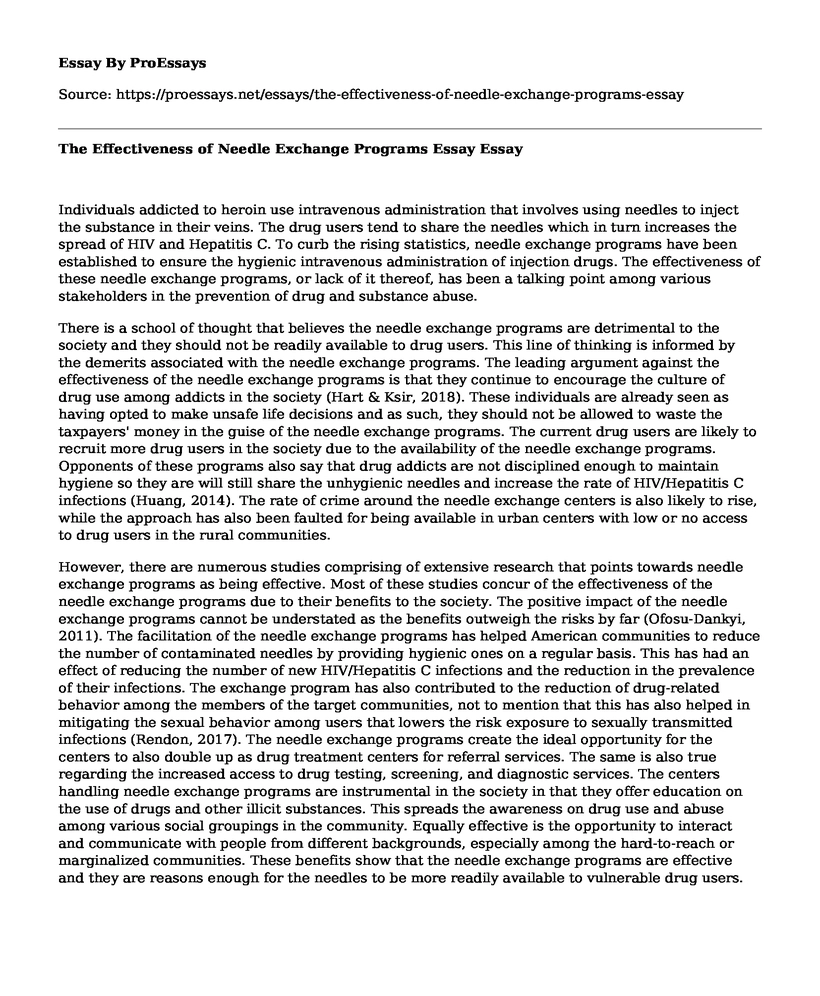Individuals addicted to heroin use intravenous administration that involves using needles to inject the substance in their veins. The drug users tend to share the needles which in turn increases the spread of HIV and Hepatitis C. To curb the rising statistics, needle exchange programs have been established to ensure the hygienic intravenous administration of injection drugs. The effectiveness of these needle exchange programs, or lack of it thereof, has been a talking point among various stakeholders in the prevention of drug and substance abuse.
There is a school of thought that believes the needle exchange programs are detrimental to the society and they should not be readily available to drug users. This line of thinking is informed by the demerits associated with the needle exchange programs. The leading argument against the effectiveness of the needle exchange programs is that they continue to encourage the culture of drug use among addicts in the society (Hart & Ksir, 2018). These individuals are already seen as having opted to make unsafe life decisions and as such, they should not be allowed to waste the taxpayers' money in the guise of the needle exchange programs. The current drug users are likely to recruit more drug users in the society due to the availability of the needle exchange programs. Opponents of these programs also say that drug addicts are not disciplined enough to maintain hygiene so they are will still share the unhygienic needles and increase the rate of HIV/Hepatitis C infections (Huang, 2014). The rate of crime around the needle exchange centers is also likely to rise, while the approach has also been faulted for being available in urban centers with low or no access to drug users in the rural communities.
However, there are numerous studies comprising of extensive research that points towards needle exchange programs as being effective. Most of these studies concur of the effectiveness of the needle exchange programs due to their benefits to the society. The positive impact of the needle exchange programs cannot be understated as the benefits outweigh the risks by far (Ofosu-Dankyi, 2011). The facilitation of the needle exchange programs has helped American communities to reduce the number of contaminated needles by providing hygienic ones on a regular basis. This has had an effect of reducing the number of new HIV/Hepatitis C infections and the reduction in the prevalence of their infections. The exchange program has also contributed to the reduction of drug-related behavior among the members of the target communities, not to mention that this has also helped in mitigating the sexual behavior among users that lowers the risk exposure to sexually transmitted infections (Rendon, 2017). The needle exchange programs create the ideal opportunity for the centers to also double up as drug treatment centers for referral services. The same is also true regarding the increased access to drug testing, screening, and diagnostic services. The centers handling needle exchange programs are instrumental in the society in that they offer education on the use of drugs and other illicit substances. This spreads the awareness on drug use and abuse among various social groupings in the community. Equally effective is the opportunity to interact and communicate with people from different backgrounds, especially among the hard-to-reach or marginalized communities. These benefits show that the needle exchange programs are effective and they are reasons enough for the needles to be more readily available to vulnerable drug users.
References
Hart, C. L., & Ksir, C. (2018). Drugs, society & human behavior. New York, NY: McGraw-Hill Education.
Huang, G. (2014). Modeling the impact of needle exchange programs accounting for both HIV and HCV Infections and HIV/CV Co-Infections. Kingston: Queen's University.
Ofosu-Dankyi, C. A. (2011). Impact of syringe exchange programs in the United States: Strengths and weaknesses. Minnesota State University: Moorhead.
Rendon, J. G. (2017). Needle exchange programs for the prevention of HIV: Their impact on the community. Fb&c Limited.
Cite this page
The Effectiveness of Needle Exchange Programs Essay. (2022, Jul 07). Retrieved from https://proessays.net/essays/the-effectiveness-of-needle-exchange-programs-essay
If you are the original author of this essay and no longer wish to have it published on the ProEssays website, please click below to request its removal:
- Discrimination Against People With Mental Health Problems
- Research Paper on E-Cigarettes
- Reflection: The Crime of Incest
- Changes in the Approach to Management Since the Industrial Revolution Essay
- Geostrategy Role Play: Human Security and the Fight on Terrorism Essay
- Evidence-Based Obesity Prevention in Childhood Essay Example
- Essay Example on Child Abuse: Impacts on Mental Health







